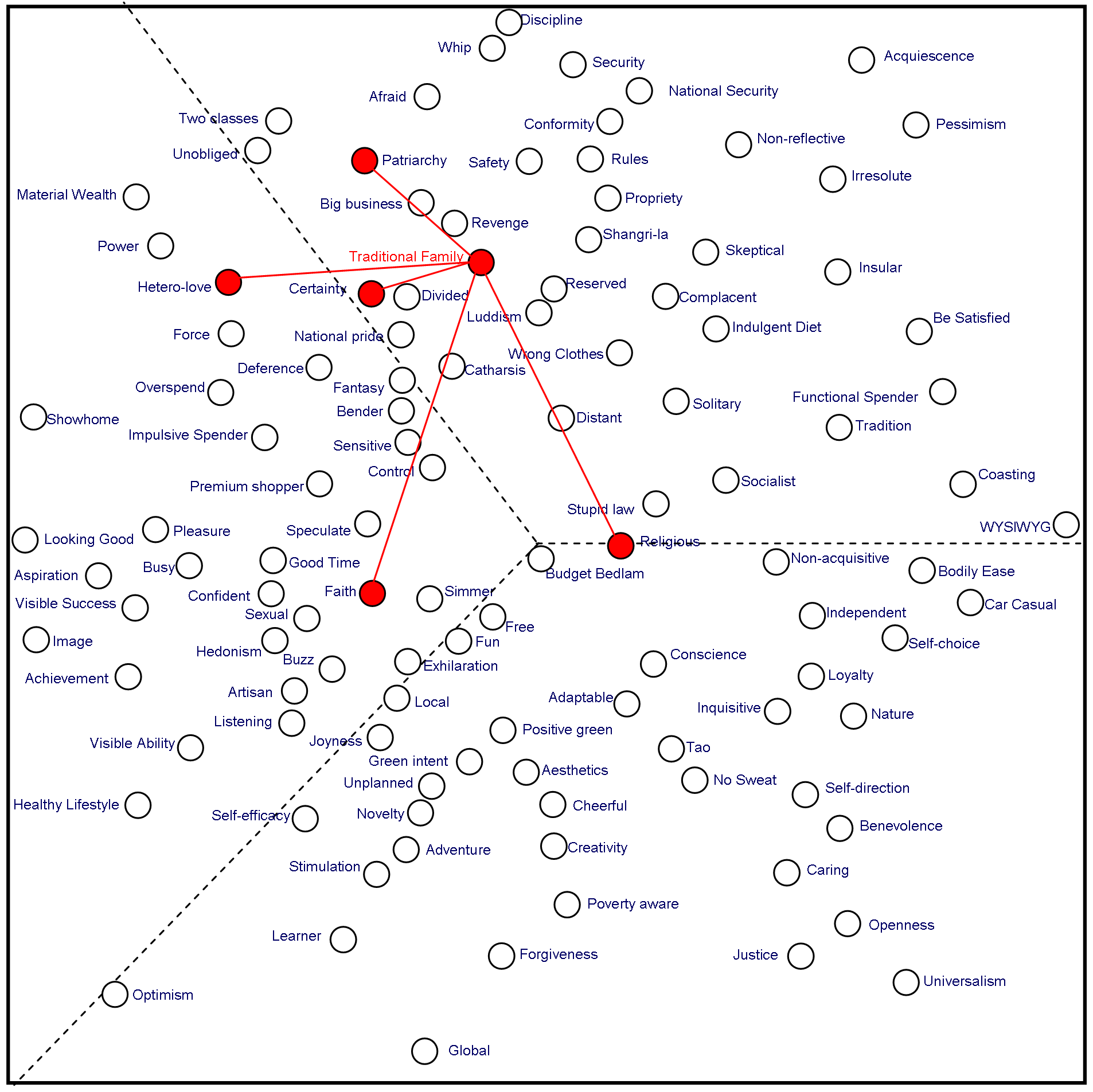

TRADITIONAL FAMILY
 |
I believe that, if people want to have children, they should get married.
I think families should stay together for the sake of the children, even if the parents don’t get along.
Espousers of Traditional Family really are the core of the Settler values set – one that is shared to some extent by the more conformist Prospectors. They over-index in the oldest age group, which contains a lot of retirees. Among those working they tend to be richer and more in the professional class than the middle class or working class. The most interesting part of the demographic profile is that the lowest espousal rates are in the family-raising ages, from 25 to 54. Perhaps this sentiment is more a judgemental platform for overview rather than a true guide for moment to moment living.
Traditional Family espousers are judgemental of themselves and others and use their religion and faith as a bedrock for their lives.
Unlike many other Attributes in this area of the map, they have not rejected the morals and morality with which they have been raised. They are much more likely than the average man person to put their faith in a universal power, or God. With this belief comes a predilection to use prayer and meditation as a part of their behaviour patterns.
Their world is shaped by their religious faith and practices. In the UK this may mean an above-average level of attendance at a Protestant or Catholic church, or it may be greater engagement with other churches, witnessed by the rising number of members of charismatic churches. The type of church is not as important as the values that drive its members, many of whom will be Traditional Family espousers. The Attribute in the UK, a country largely of Christians, is not confined just to Christianity. Almost all other forms of religious practice are driven by this life orientation.
Because this is the basis for their morality, other significant aspects of their lives are deeply rooted in their sense of self-identity, which can often lead to conflict in more individualistic cultures and the organisations within those cultures. The periodic public squabbles within the Church of England in the UK about women’s roles, or the debates about single-sex marriage in many countries, are reflections of this perspective based on personal morals.
They believe that the family is made of one man and one woman. The role of the wife is to be the ‘home maker’, staying at home and bringing up the children in the ways of the parents. The husband’s job is to go to work and provide for the family.
In this household it is acknowledged that the man is superior to the woman. This holds true for both the male and the female.
Because of the belief that they should stay together if they have children, their personal differences must be set aside for the sake of the children. They are just as likely to have happy, loving families where everyone knows their role and feels safe as they are to have families that are loveless and barren and held together by a duty to their religion but little emotional attachment between the mother and father. The traditional family is a two-edged sword when guided by Traditional Family values.
Politicians often try to appeal to Traditional Family espousers. These same politicians are often judged as breaking their own publicly-stated rules. This is a hard Attribute to use for political purposes, unless it is truly believed-in.
Using Traditional FamilyDemographic Skews: 1) Over-indexed: Male, 22-24. 2) Under-indexed: Female, 45-54. Traditional Family espousers also espouse other Attributes. The top five most highly correlated Attributes of Traditional Family espousers are, in order of the strength of relationship: 1) Force In total those who espouse Traditional Family also over-index significantly on 33 other Attributes. |
|
If "Traditional Family" (or the associated attributes) are important to you and you would like to delve more deeply, contact us at mail@cultdyn.co.uk
